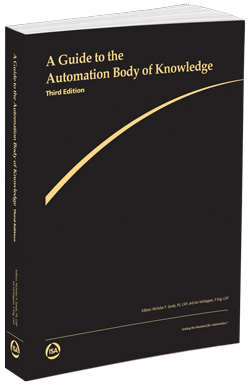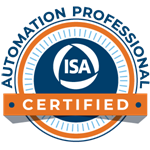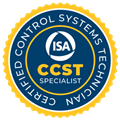
Engineering and Technology Online Studies
CAP - Certified Automation Professional
CAP certification provides a non-biased, third-party, objective assessment
and confirmation of an automation professional's skills.
The CAP exam specifically focuses on direction, definition, system design,
software, deployment, development/application, documentation, support of
systems, and equipment used in control systems, manufacturing systems,
information systems, systems integration, and operational consulting.
The CAP certification exam reflects the documented knowledge, skills, and
abilities needed for competent job performance.
To qualify to become a CAP, you must meet the minimum requirements for
work experience and education and you must pass a multiple choice exam.
Visit the ISA (International Society of Automation) website:
https://www.isa.org/certification/cap
Qualifications and Experience
- Sets the standard for the automation professional.
- Promotes safety and improves productivity.
- Establishes your professional credentials.
- Prepares you for additional job responsibilities.
- Improves ROI by impacting mission critical decisions.
- Proves that you're an automation leader.
To qualify to become a CAP:
- You must meet minimum requirements for work experience and education.
- You must pass a multiple choice exam.
If you hold a four-year technical degree:
- Four-year academic degree from an accredited educational institution in a technical or technology field, including engineering, chemistry, physics, math, etc., documented with an official transcript.
- Academic degree (or equivalent) in a related technology area, to a maximum of four years.
- Related work experience, including a minimum of five (5) years documented work experience during the five-year period immediately prior to your application date. One year of work experience means at least 1500 hours of active employment.
If you hold a two-year degree or do not have a degree:
- Two-year academic degree from an accredited educational institution in a technical or technology field, including engineering, chemistry, physics, math, etc., documented with an official transcript.
- Academic degree (or equivalent) in a related technology area, to a maximum of two years.
- Related work experience, including a minimum of ten (10) years documented work experience during the ten-year period immediately prior to your application date. One year of work experience means at least 1500 hours of active employment.
- An Associate Degree in automation or a related technology from an accredited educational institution will count as two (2) years of work experience, when documented with an official transcript.
- Evidence of responsible charge position†
- Two (2) work-related references demonstrating that the applicant has had at least two (2) years experience in automation in a position of responsible charge.
† The span of control necessary to be considered in a position of responsible charge includes
- Personally makes critical automation project decisions or reviews and approves proposed decisions prior to implementation, including consideration of alternatives. OR
- Judges the quality of other technical specialists and the validity and applicability of their recommendations before such recommendations are incorporated into the work.
- Work experience and educational periods may not overlap when compiling the total number of years required for this certification. For a more detailed description of the CAP requirements, visit www.isa.org/CAP.
The automation body of knowledge
The automation body of knowledge is broad and covers basic continuous control; discrete, sequencing, and manufacturing control; advanced control; reliability,
safety, and electrical; integration and software; deployment and maintenance; and project work structure.
For a person to pass the CAP exam, he/she must have a strong knowledge of these technical areas:
- Basic Continuous Control: Instrumentation, analyzers, and control valves; PID control; tuning controllers; control documentation; and DCS systems.
- Discrete and Manufacturing Control: Manufacturing sensors, actuation, discrete, and sequencing control; PLCs and motors and drives; and motion control.
- Advanced Control: Process modeling and simulation, ISA88 batch, advanced process control, environmental monitoring, and building automation.
- Reliability, Safety, and Electrical: Alarm management, safety instrumented systems, electrical installations, and electrical safety.
- Integration and Software: Digital communication concepts, industrial communication protocols, manufacturing execution systems and business integration, security, operator interface, and data management.
- Deployment and Maintenance: Operator training, checkout, testing, startup, troubleshooting, and maintenance concepts.
- Work Structure: Project definition and justification, project management, interpersonal relationships, and working with teams.
CAP® Exam Body of Knowledge Document
Certified Automation Professional Associate
Don't feel ready to take the Certified Automation Professional Exam?
Try the CAP Associate Recognition Program Exam

The Control Systems Online Training Courses:
Purchase Control Systems Certification Exam Study Guides |
|||||||||
| |||||||||









